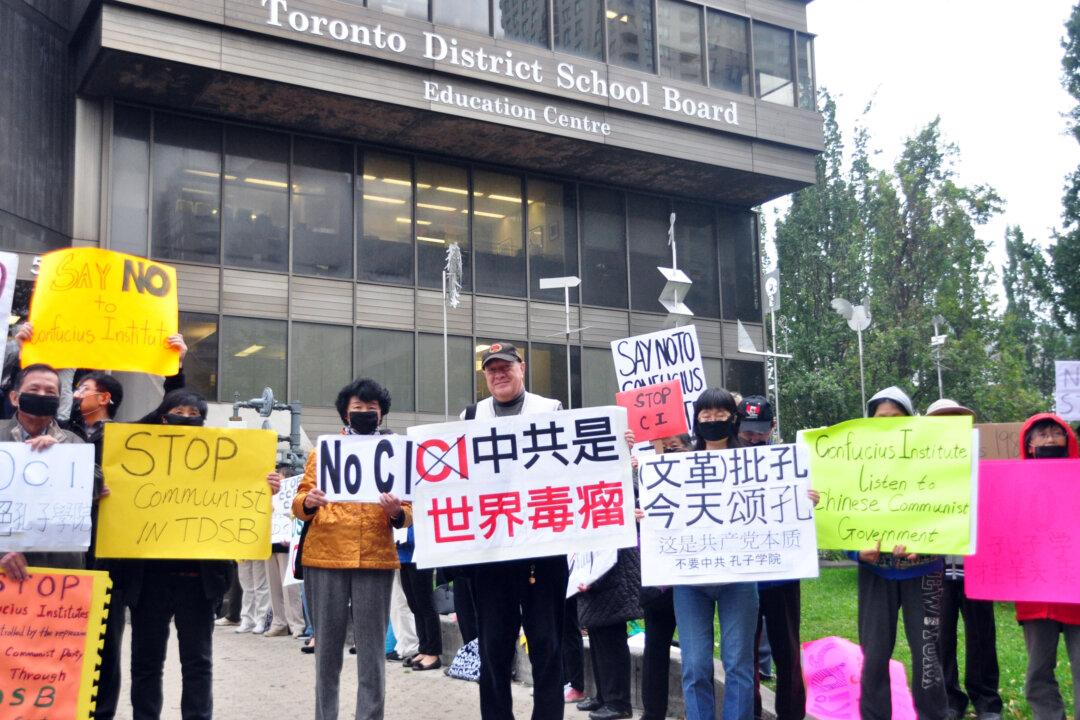Less than a week before Canada’s largest school board votes on whether to end its partnership with the controversial Beijing-run Confucius Institute, Chinese officials have issued a letter seeking to terminate the agreement.
The letter, addressed to the Toronto District School Board, was issued on Oct. 23 by the Hunan Provincial Department of Education, which was to supply instructors and members on the TDSB’s Confucius Institute advisory board under the existing agreement. A copy of the letter was obtained by Epoch Times.
“Given that TDSB failed to fulfill our agreement on the Confucius Institute, the cooperation between our two parties cannot proceed, so I officially propose that we terminate our partnership on the Confucius Institute as from today,” wrote Kermin Wang, director general of the Hunan Provincial Department of Education.
Pamela Gough, trustee for Ward 3, says the letter is an effort to save face by the Chinese officials since they know the TDSB is likely going to vote to end the partnership next week.
“It’s a case of them perceiving they can count votes the same as we can. … They’re taking a proactive step as a face-saving measure to get out if it before the TDSB does,” says Gough.
A TDSB committee voted early this month to sever ties with the CI. The issue is to be voted on by the entire board on Oct. 29.
Gough says a number of trustees are taking issue with Wang’s letter, finding the wording “too harsh” and “completely tactless and undiplomatic.”
“The TDSB did not fail to fulfill any agreement. The TDSB is working through its own process to decide whether they want to pursue the agreement. They haven’t even started up the agreement,” she says.
TDSB chair Mari Rutka said she doesn’t want to comment on the motives of the Chinese officials in seeking to end the agreement, but said the board needs to make its own decision on the partnership.
The TDSB also has an agreement with Hanban, the headquarters of Confucius Institute in China. According to Rutka, no similar letter has so far been received from Hanban that she is aware of.
Branded as cultural programs aimed to teach Chinese language and culture, Confucius Institutes have been cited by Chinese officials as tools to advance the Chinese Communist Party’s soft power and have been cited by Western counterintelligence officials as being involved in espionage.
The TDSB’s CI partnership was championed by former chair Chris Bolton while the rest of the board was provided minimal information about the agreement. Bolton resigned in June a few months before the end of his term amid concerns raised by parents and many of the trustees about the partnership.
CIs Used as Spy Agencies
Michel Juneau-Katsuya, a former senior manager with the Canadian Security Intelligence Service, addressed the committee members at their Oct. 1 meeting. He cited several groups with links to the Chinese regime who rallied support to keep the TDSB Confucius Institute.
According to the intelligence veteran, there are online records that representatives from such groups as the National Congress of Chinese Canadians (NCCC) and its founder Ping Tan, the Confederation of Toronto Chinese Canadian Organizations, and the Beijing Association of Canada have been received and/or praised by Beijing officials. In a past interview with Epoch Times, the NCCC denied being controlled by “any party or political force.”
Juneau-Katsuya also told the committee that CIs pose a threat to Canada as they are used as spy agencies for the Chinese regime.
In a written statement, TDSB communications director Ryan Bird said voting on the Confucius Institute will still be on the agenda for the Oct. 29 meeting, and the TDSB will pay back $215,000 to the CI if the board votes to end the partnership.
Copies of agreements between the TDSB, the Hunan Provincial Department of Education, and Hanban obtained by Epoch Times under Ontario’s Municipal Freedom of Information and Protection of Privacy Act make no mention of cancellation penalties.
Late last year, the Canadian Association of University Teachers issued a statement calling on all Canadian universities and colleges to cut ties with CIs, calling them “political arms of the Chinese government.” The association’s American counterpart, the American Association of University Professors, followed up with its own statement this year asking American universities not to partner with CIs.
Both McMaster University and the University of Sherbrooke have ended their CI programs. In the United States, Pennsylvania State University and the University of Chicago have also terminated their partnerships with the controversial program.





